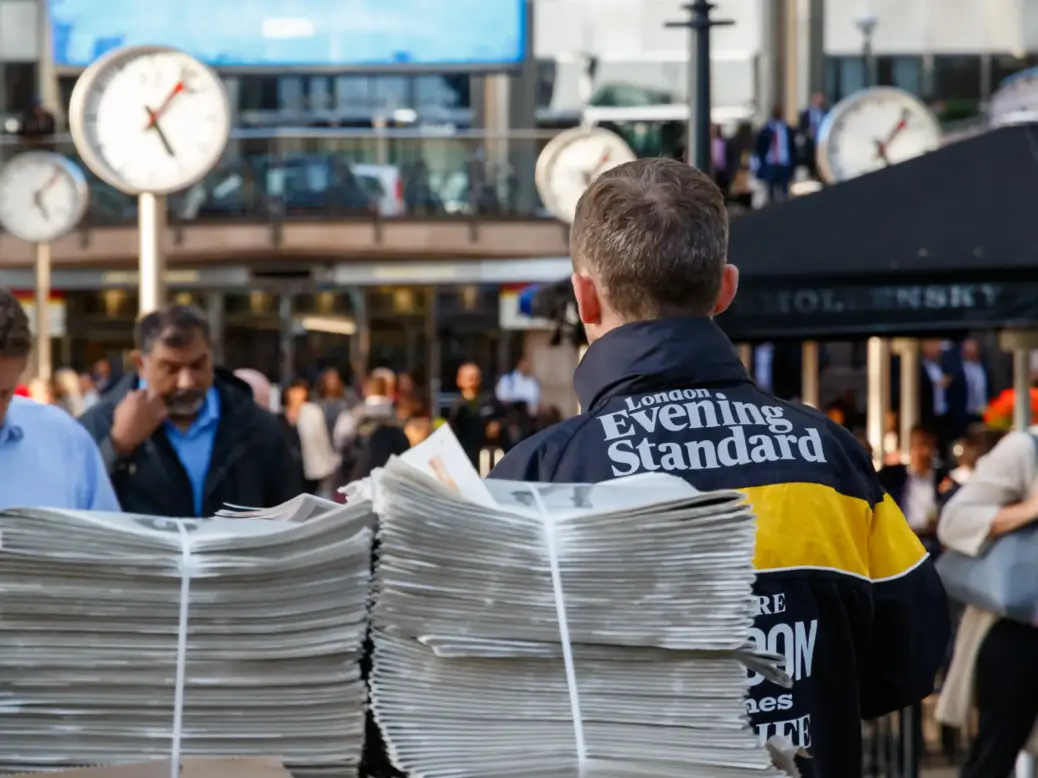
The Evening Standard is set to begin phasing out its daily print newspaper within a month as it prepares to go down to a weekly print edition.
The free London newspaper will stop publishing on Mondays and Fridays from 2 August, as a precursor to going weekly.
The future of its weekly ES Magazine remains in doubt and staff are unsure if its 19 July issue could be its last.
The Standard is preparing to make cuts expected to affect half of its journalists, with the first of two scheduled voluntary redundancy rounds due to open before the end of this week.
Staff were first told of plans to end the Standard’s daily newspaper on 29 May but it remains unclear when the new weekly edition will launch.
In a meeting between management and editorial staff selected to represent the newsroom in the consultation process chairman Paul Kanareck said that by going down to a weekly print schedule the editorial team will be able to focus purely on digital performance with the weekly newspaper a “bolt on” to that process.
The weekly will also have an additional budget for newspaper-only content, meaning staffers are free to focus on the website.
Almost 70 Evening Standard redundancies expected
At the time of the meeting, Thursday 4 July, the business was planning to make 66 editorial redundancies, representing approximately half the editorial staff — although staff were told this number could change. More than 80 people are at risk of redundancy.
The company’s plan is to reorganise the Standard around a set of “hubs” that would “make the most of the resources we will have and create a more agile structure”, management said.
The hubs would include an “Audience and Multimedia Hub”, a “News, Politics and Business hub”, a “Life Hub”, a “Pictures, Design and Production Hub” and a “Sports Hub”.
Sport will apparently be one of the less badly-hit parts of the business, because it “is already really highly digital and extremely successful in terms of traffic and brand safe revenue”.
The reorganisation will involve the creation of several new roles and the abolition of deputy titles, with most staff expected to have to reapply for their jobs.
Press Gazette understands Evening Standard editor-in-chief Dylan Jones has not yet addressed staff about the changes.
The future of ES Magazine remains in question.
The September issues of the magazine are among the most lucrative of the year and advertisers are keen to know whether or not it is coming out.
Staff have been told “there’s a separate business proposal being prepared” for the magazine, but insiders appear to be concerned 19 July could be the last edition.
A company spokesperson told Press Gazette: “We are consulting with staff and colleagues on proposed changes at the Evening Standard. No decision has been taken on the future of ES Magazine.”
Press Gazette understands there has been “widespread dismay” amongst staff at proposed redundancy payments, which for those accepting voluntary redundancy are understood to be the statutory minimum plus £1000.
Management has told staff they are expected to work their full notice period unless they secure another job during that period. If they do get another job, they will only be paid their notice period up until the point they leave.
Staff at risk of redundancy have been told they must use up any unused annual leave because they will not be paid for any left over.
Evening Standard chairman Kanareck, a former Guardian Media Group chief commercial and customer officer, has told staff the Standard’s shareholders were not willing to provide extra money toward the redundancy pot.
In comments circulated amongst staff after a meeting with their representatives, he said: “We’re loss-making, and when you’re loss-making, and have negative cash flow, in order to keep the business sustained, the shareholders are required to constantly put money into the business to sustain it from month to month.
“So there is not a large pot of money sitting in the bank. We have negative working capital…
“The shareholders have given a certain amount to fund the transition and transformation, and this is what we have in terms of funding in order to do this.”
The Evening Standard’s main shareholder is Lord Evgeny Lebedev, who directly owns 60% of Lebedev Holdings Limited, which in turn holds 95% of the equity in Evening Standard Limited.
Another 30% of Lebedev Holdings is owned by an entity identified in Companies House only as “International Media Company” —which is believed to be representing Saudi investor Sultan Mohamed Abuljadayel. Justin Byam Shaw owns 10% of Lebedev Holdings.
The i reported last month that the decision to enact cuts at the Standard, which has been loss-making for the last six years, came after Abuljadayel pressured Lebedev to take action to minimise the cash outflow. The Evening Standard made a loss of £14m last year on turnover of £32m.
Email pged@pressgazette.co.uk to point out mistakes, provide story tips or send in a letter for publication on our "Letters Page" blog
